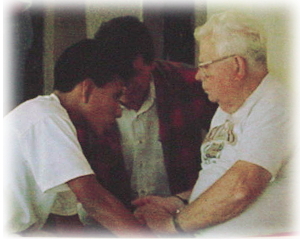E. Evans
, "...it is God's appointed method of our obtaining what He has to bestow (Dan. 9:3, Matt. 7:7-11, 9:24-29, Luke 11:13)."
A. Vain repetition (Mt. 6:5-15)- If you remember from the previous lesson, I encouraged you to repeatedly speak passages that expressed worship to God. Repetition is fine, but vain repetition would include insincerity or/and the thought that repeating a prayer specifically adds favor with God. When I was Roman Catholic, after confessing our sins to a priest, we would have to do penance by praying a certain number of prayers, repeating the same ones. This was vain because no amount of prayer can ever make up for any sins we commit. Some religions place written prayers on prayer wheels and spin the wheel, hoping the multiple revolutions will repeat the petition(s). This is also vain.
C. To "show off" (Mt. 6:5)
D. With hindrances, that is, with sins and / or a sinful mindset. Here, I must think of King Saul, the first king of Israel. When he first became king he was very humble, but after a time he permitted pride in his spirit and began committing one transgression after another. Before he died, we read in 1 Sa. 28:6a, “And when Saul inquired of YHVH, YHVH answered him not . . .”
E. To someone other than God (Jn. 14:6)- It is against Holy Scripture to pray to Mary, Joseph, or any other person deemed a "saint"; a deceased loved one or acquaintance, the "angel Moroni," or any other being.
F. Confusing literary gender in reference to God- There is currently a move to use "she" in reference to God. Not once in the actual Holy Scriptures is "she" used in connection with God, Father, Son, Holy Spirit, Christ, etc. In regard to our corporate relationship with God, the term "she" is assigned to the Church, the Body of Christ, and to the Bride of Christ. God so chose to use the male gender terms for Himself. As mentioned in a previous lesson, the reason is, in part, to establish the proper relationship between Him and us. It is also confusing to refer to God as "Mother God". This introduces people into non-Scriptural / non-Christian teachings. If we refer to God as "Mother God" this is direct disobedience to our Lord's teaching that we should pray "Our Father, Who art in heaven" (Mt. 6:9; see also Lk. 6:36, 12:30 and 32).
III. How To Pray
A. To the Father (Mt. 6:9)- You also may pray something like, "my Father," or "my heavenly Father." I have heard that some places in Scotland there are some Christians who endearingly pray, "Papa God." See Rom. 8:15.
B. Through the Son (1 Tim. 2:5)- Note this verse says there is only
one mediator. So we are not to pray to Mary, Joseph, Theresa, and the rest. Everyone is out. Our only mediator is Christ Jesus (Psa. 73:25).
C. In and by the Holy Spirit (Eph. 6:18, Jude 20)- The Holy Spirit will often guide us as to what to pray for and how to pray for it.
D. With faithfulness (Luke 18:1-8, Rom. 12:12)
E. That means you can pray more than once for something. Even Jesus had to pray more than once for a specific request. See Mk. 8:22-25.
F. Mainly in private (Mt. 6:6). It is, of course, acceptable and expected to pray with others (Acts 27:35).
G. Continuously (1Th 5:17), like breathing. Endeavor to constantly fellowship with God through Christ!
J. With Watchfulness (Mk. 14:38a –
"Watch and pray, lest you enter into temptation.") This is akin to what was said above about hearing from God. “Temptation” in this verse may be translated as "trial." This suggests to me that while praying by the Holy Spirit we should be discerning whether we need to deal with any spiritual forces, good or bad. And here is something to remember. Satan will, from time to time, try to tell you it is no use to pray. This has happened to me numerous times, especially when one of those I am to spiritually care for were growing cold toward the Lord. I had to ignore that negative spirit and pray anyhow. And, by the way, God had His way in those lives. So, pray anyhow! Worshiping will also help break that negative spirit.
K. According to His Will (1 John 5:14)-You might not know specifically the will of God at all times, but the way to begin is to pray for things that you know, from reading the Holy Bible, what God wants. For one thing, He wants all to repent and trust fully in Him (2 Peter 3:9). Also see Psa. 122:6, Mt. 5:44, and 1 Tim. 2:1-3 for some more examples of what God wants us to pray about. As you pray for God's known will, He will increase your sensitivity to understand other facets of His will.
L. Regarding physical aspects dealing with prayer, nowhere in the Holy Bible does it state that we must pray with our eyes closed and hands folded. While that is fine, we are to remember we are to pray at all times so we most certainly can pray while driving, working and other things. Also, while kneeling is good, some have trouble kneeling. The Holy Bible indicates one can pray in any position — standing, sitting, prone, prostrate and more.
IV. Elements Of Prayer
Examples of Intercessory Prayer
|
Twenty-seven Christians in the U.S.A. one night felt led by the Holy Spirit to pray for a missionary in Australia. Just before that time, the missionary was conducting a series of services. Having no place to stay, this missionary would camp out in the fields. One night, after the above mentioned prayer meeting, the missionary had just concluded a service when a man approached him. This man said that he had been at the missionary's camp the previous night in an attempt to kill him! The man told the missionary he could not do it, for his tent was surrounded—by twenty-seven people!
|
Going back a century or so to England, a man named George Mueller was told by God to start an orphanage for children. He did. One morning they arose and gathered for breakfast, but there was no food. Bro. Mueller began to ask the blessing and thank God as usual for His provision. Just moments after he started to pray, there was a knock on the door. It was a merchant who was going to town to sell his bread when a wheel came off of his carriage. He was too far from town for the bread to be any good, so he gave it to the orphanage!
|
|
Relatives of ours were heading for divorce court. The husband was the one who had filed for divorce. Dorcas and I were led of God to pray that confusion would come between the lawyer and the husband. A week after the court case was held, his wife called. She said the case had to be stopped after an argument occurred between her husband and his lawyer! To make a long story short, the divorce never went through and God has been mending the situation. Dorcas and I have seen many, many other answers to intercessory prayer. Let God use you! |
A.
Praise and Adoration (Psa. 22:23, 2 Sam. 22:4, Rev. 5:12)- The most powerful prayers in the Holy Bible always included the mention of the attributes of God.
D.
Confession (Mt. 6:12)- In this respect, it is always good to pray for our own selves first before we pray for others.
E.
Intercession (1 Tim. 2:1)- Pray for the will of God to be done in hearts and lives. Intercession is a prime activity of spiritual warfare. Some Christians have been known to be called specifically to a ministry of intercession. Many testimonies can be given to attest to the fact of the power of intercessory prayer. To the right are some examples.
F.
Prayer time can be one of simple fellowship with God without any requests. It can be comprised of only worship.
G.
Supplications (requests, pleas) / intercessions should be mingled with thanksgiving and worship (Phil. 4:6)- This point was driven home to me by God when we were pastoring in Flintstone, MD. The church had so many bills piling up and I was unhappy, of course, about the situation. However, I gained more strength in prayer as I praised God anyway amongst all the requests.
H.
Acknowledging The Sovereignty Of God: God is not a genie. God is the King of all creation. We ought not demand anything from Him, but lovingly trust Him to answer our prayers according to
His will.
I.
Emergency supplication / intercession does not have to be preceded by praise! Hey, if you are about to be robbed or hurt, a quick "help me" to God is OK!
V. Neglecting Prayer . . . 3
A.
Is grievous to the Lord (Isa. 43:21-22, 64:6-7).
B.
Can result in various types of trouble (Zeph. 1:4-6, Dan. 9:13-14; cp Hosea 7:13-14, 8:13-14).
C.
Is a sin (1 Sam. 12:23).
D.
Results in the lack of the necessary blessings in life (James 4:2).
VI. Additional Reasons to Pray
A.
To Increase Our Faith And Faithfulness: Prayer is one way in which we trust God. Trusting God is an aspect of faith. Our faithfulness is also increased if we act upon the fact that we should remain committed to God whether or not He answers our prayer according to the way we would like.
B.
To Have Fullness Of Joy: (Jn. 16:24): Joy is one of the fruits of the Holy Spirit. Notice, though, we need to ask in the Name of Christ. This implies asking according to His will. See 1 John 5:14.
C.
To Enjoy His Presence (Rev. 3:20): "Sup," meaning to dine, during which time there is fellowship at dinner.
D.
To Increase Our Sensitivity To God's Voice (John 10:27)
E.
To Help Others (2 Cor. 1:11)
In closing, remember that prayer with God is to be constant. We are to have our focused times of prayer, both privately and publicly. However, just as we constantly breathe, we are to constantly remain in fellowship with Him. Concerning prayer, George Mueller said,
“I live in the spirit of prayer. I pray as I walk about, when I lie down and when I rise up. And the answers are always coming.” 4
Take a quiz on this lesson if you would like to. English only.
-------------------------------------
1Evans, William: The Great Doctrines of the Bible (Moody Press: Chicago; 1970) p171
2Evans (as noted in
1); p172
3Evans (as noted in
1); pp171-2
4From georgemuller.org
See how well you have learned this lesson!
Continue to the next lesson,
Enjoy Your Holy Bible
Lesson Menu
View the Glossary
Go to the Index
Abbreviations and about Reference Notations


